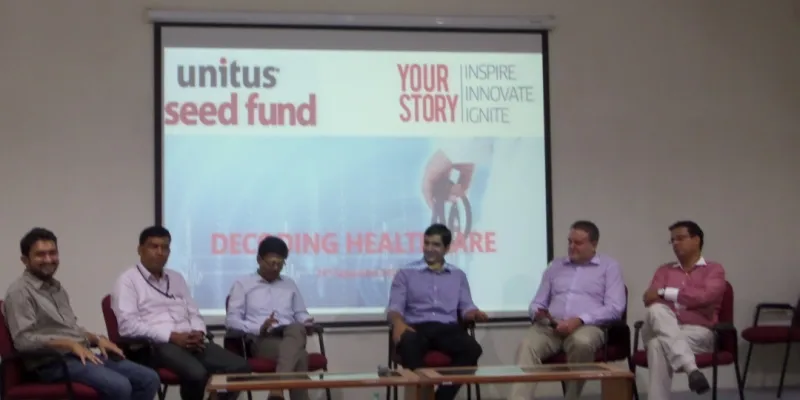Despite $3.37B from foreign funds, health sector in India is under invested
The healthcare segment, especially the healthtech segment is at the brink of explosion. The healthcare segment is gaining traction as it has attracted foreign funds to the tune of USD 3.37 billion in January–July, which is almost half of the total overseas flow into the domestic capital market.
For the entire 2013, net investments for the healthcare sector stood at USD 1.86 billion, and USD 309 million for 2014. Even in terms of percentage share, investor interest in healthcare of the world’s second-most populous country has never been so high. Market experts put it all down to a host of factors, including wider profit margins, increased demand for generic drugs, and M&A activity in the sector. Analysts stay bullish on the sector, saying the heightened interest will continue in the near future. However, panelists at the decoding healthcare event this week in Bengaluru by Unitus Seed Fund had a different idea.
Clarity of solutions
And yet many believe the investments in healthtech startups are less or limited. "If you have a solution for an actual problem you will get funded," says Viren Shetty, Director of Strategy, Narayana Hrudayalaya Hospitals, in a panel discussion with Dave Richards, Unitus Seed Fund, Ganapathy Venugopal, Axilor Ventures, Dr Anand Lakshman, Address Health, Amit Rathi, and Taslimarif Saiyed of BIRAC.
Ganapathy Venugopal of Axilor Ventures said that of all the different types of healthtech startups they've seen only 10 seemed to catch their eye, and only one is under consideration. This he says is because unlike other segments like e-commerce, there isn't a clear hierarchy in the stage of the business. The hierarchy, he adds, makes a sector open for different kinds of investors with different risk appetites. "In healthtech segments the risk profile is very skewed," says Ganapathy.

Going back to the drawing board
Viren adds that if the investor is stingy it's because the product isn't good. From his experience of working at a hospital and meeting several startups, Viren says, you need to be open and intuitive to the solutions you're offering. "There are many times when the startups come in and pitch an idea. They believe that they have the perfect solution and aren't open to listening. For the hour we meet, almost 80 percent of the times they will be talking and they don't listen. It's important to have an open mind," says Viren.
Also Read: Healthcare startups rope in technology to bridge the supply-demand gap
App heavy solutions
Many of the panelists believed that most healthtech startups come in with a problem from their personal lives and believe that it's the solution the medical world needs. Taslimarif Saiyed of BIRAC adds that there needs to be a diversity in approaching solutions. He adds that there seems to be a dearth of devices. He says that while it makes sense to go the app way looking at market trends, wearables and other devices seem to be taking a backseat in the Indian ecosystem.
Opening up of the risk appetite
While the solutions are skewed, one can't ignore the fact that the funding in the space is limited. Amit Rathi adds that investors also need to be open to healthtech segment. Dr Anand Lakshman of Address Health compares the healthtech space to cricket. He says that before the IPL, the window of opportunity for several players to get selected was limited. "The Indian healthtech space needs an IPL like body that opens opportunity for several startups," adds Anand. Expected to touch USD 79 billion in 2012, the healthcare sector is now expected to reach USD 160 billion by 2017, and USD 280 billion by 2020. Today, it is considered one of the largest sectors in India, both in terms of revenue and employment.
Nevertheless, with the growing number of mobiles and smartphones that are present in the Indian market, it is said that healthcare providers in India are poised to spend USD 1.08 billion on technology in 2014. However, several believe that it is one of the last sectors that technology has affected.







